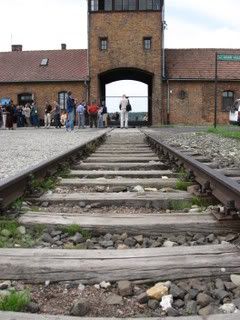
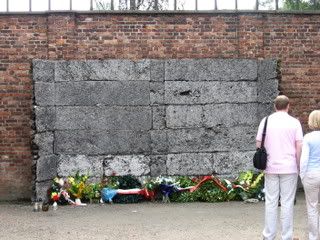
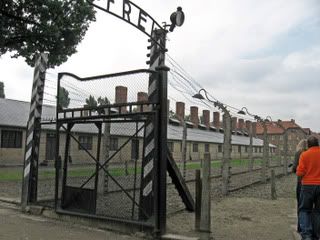
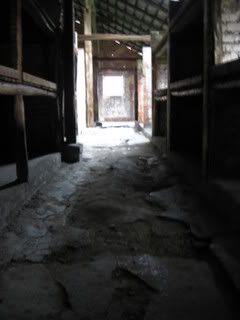
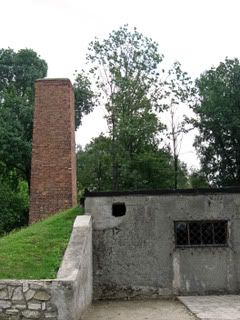

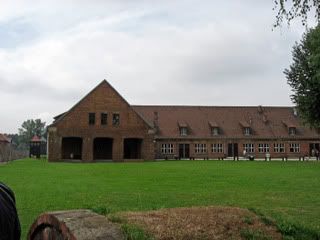
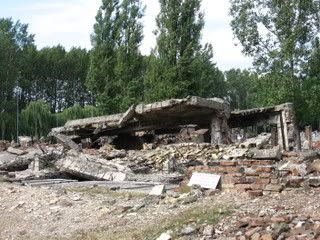
Posted on 04/28/2009 12:27:53 AM PDT by nickcarraway
The note, written in pencil then rolled up and inserted in a bottle, contains the names of seven young people who probably thought they
were doomed to die in the notorious Auschwitz death camp.
A construction crew renovating a cellar near the Auschwitz site discovered the bottle hidden in a concrete wall, officials said on Monday.
Dated September 9, 1944, the note bears the names, camp numbers and hometowns of the seven prisoners -- six from Poland and one from France. "All of them are between the ages of 18 and 20," the final sentence reads.
"They were young people who were trying to leave some trace of their existence behind them," said Auschwitz museum spokesman Jaroslaw Mensfelt. He said two of the prisoners survived the camp but he did not have further details.
Workmen were tearing out a wall in the basement of a college building in the town of Oswiecim -- which was called Auschwitz by the Nazis during World War II -- on April 20 when they discovered the bottle, college spokeswoman Monika Bartosz said.
She said the note appeared to have been written on a scrap from a cement bag.
Museum experts have verified the authenticity of the note, which will be handed over to the museum in early May.
The Nazis set up the Auschwitz camp in 1940 in occupied Poland.
That is really moving...I am copying and pasting a poem I read in a museum in Ohio. While completely different circumstances, it has that same basic need to leave something to prove one was here. The young lady who wrote this poem was 15 on the frontier of America at that time and was contemplating her life and possible death during that dangerous time. Her words reached out over two hundred years and touched my soul and have left me haunted by her memory.
When this you see
Remember me
Why should I say t’is yet too
Soon to seek for heaven or think
Of death of a flower may fade be
Fore t’is noon and I this day
May loose my breath
Molly Ransom sampler
wrought in
Watertown August
20th in the 15th year
Of her age 1789








|
|
|||
Gods |
Just adding to the catalog, not sending a general distribution. |
||
|
· Discover · Nat Geographic · Texas AM Anthro News · Yahoo Anthro & Archaeo · Google · · The Archaeology Channel · Excerpt, or Link only? · cgk's list of ping lists · |
|||
If you'd like to be on or off, please FR mail me.
..................
Agence France-PresseApril 28, 2009 1:18 PM
Albert Veissid, a former prisoner of Auschwitz death camp, poses with documents on April 28, 2009, at his home, in Allauch, southern France. Veissid's name was found along with the names of six Polish prisoners on a message hidden in a bottle which was recently discovered by Polish workers demolishing the wall of a building that once belonged to the former Nazi German Auschwitz-Birkenau death camp. The bottle with a note inside had been placed in the mortar of a wall of a building which had served as a warehouse for the camp's Nazi guards during the war. Hand-written in pencil, the note bears the names and camp ID numbers of seven camp prisoners . All were aged 18 to 20.Photograph by: Michel Gangne, AFP/Getty ImagesALLAUCH, France - A French Holocaust survivor whose name was found in a bottled message on the grounds of Auschwitz this week said Wednesday the discovery was a "mystery" to him.
Museum officials said Monday that workers demolishing a wall that was once part of the Nazi death camp in Poland had found a hand-written message apparently signed by seven prisoners, only two of whom survived.
"I am a little shaken up by this bottle business — it's a mystery," Albert Veissid, now a sprightly 84-year-old, told AFP at his home in Allauch in southeastern France.
"It's incredible. I remember everything from the camp, from A to Z. As I speak to you now, I can see the images before my eyes.
"But this bottle business is an enigma. The biggest surprise of my life," said the former fairground worker, who was arrested by collaborationist French authorities in 1943 and deported to Poland the following year.
Dated September 20, 1944, the message listed the names and camp ID numbers of seven Auschwitz prisoners aged 18 to 20, all Polish nationals except for Veissid, who worked together on the construction of an air shelter.
Workers found it packed inside the mortar of a wall of a building in the southern Polish town of Oswiecim that served as a warehouse for the camp's Nazi guards during the Second World War, now part of a local high school.
Veissid said he remembers meeting the six Poles in question while working as a builder at the camp.
"It's true I did them some favours. There was food supplied upstairs and they used to steal tubs of marmalade, which I would hide downstairs," he said.
"Maybe they wrote my name in the bottle as a way of thanking me."
Further details about the message are expected to be made public in the coming days, the Auschwitz museum said Monday.
Veissid said he had spoken little about his experiences at Auschwitz, declining to give speeches in schools on his time there.
"But since this story intrigues me, I decided to play the game for once. It's a revolution for me."
Born into a Jewish family in Istanbul — then known as Constantinople — in 1924, Veissid arrived in the southeastern French city of Lyon as a baby.
As a young man he worked as a musician and a candy-store vendor, before being deported.
He survived until Auschwitz was evacuated in January 1945, when he walked across Germany to France, arriving in a state so emaciated that his family struggled to recognize him.
"I was a walking skeleton. One more week and I wouldn't have made it back," said Veissid, who took up work as a musician then as a salesman after recovering his health.
More than one million people, most of them European Jews, died at the twin Auschwitz-Birkenau Nazi camps during the Second World War. In total, six million Jews died in the Holocaust.
Others who died at Auschwitz included tens of thousands of non-Jewish Poles, Soviet prisoners of war, Romas (gypsies) and anti-Nazi resistance fighters from across Europe
Who could fail to be moved by this, by the shock of recollection when one is confronted by relics of a hard time, now suddenly presented for contemplation. The ghosts of persons long dead stand before us, as they were, and our ghostly former selves also.
Thanks, SJ ............. FRegards
The slogan, “Never Again” rings hollow today in Pharoh Obama and the US Congress world. They share the blame for any upcoming tragedies.
Very moving to see... there are no words..
Disclaimer: Opinions posted on Free Republic are those of the individual posters and do not necessarily represent the opinion of Free Republic or its management. All materials posted herein are protected by copyright law and the exemption for fair use of copyrighted works.